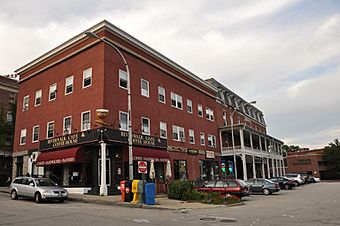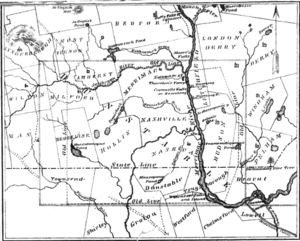Nashville Historic District (Nashua, New Hampshire) facts for kids
Quick facts for kids |
|
|
Nashville Historic District
|
|

Railroad Square: The white porch is the Laton House Hotel
|
|
| Location | Roughly centered on the junction of Amherst, Concord, and Main streets, Nashua, New Hampshire |
|---|---|
| Architectural style | Late Victorian, Italianate, Federal |
| NRHP reference No. | 84000574 |
| Added to NRHP | December 13, 1984 |
The Nashville Historic District in Nashua, New Hampshire is a special area recognized for its important history. It's like a protected neighborhood where many old and interesting buildings still stand. This district was added to the National Register of Historic Places (NRHP) in 1984.
This historic area is just north of downtown Nashua. It centers around where Concord, Amherst, and Main streets meet. The Nashua River and Railroad Square form its southern edge. Other streets like Clinton, Lock, Orange, Mount Pleasant, Abbott, and Main streets mark its other borders.
Discovering Nashville's Past
Today, people often call this part of Nashua "French Hill." But the historic district gets its name from a time in the 1800s when it was a separate town called "Nashville." This happened because of a disagreement about where to put the new Town Hall. The southern part of the city had more people, so the Town Hall was built there.
The people in the northern part decided to form their own town. They named it "Nashville." This split happened in 1836, only six years after the whole town had changed its name to "Nashua." Around this time, a new railroad line was built. It ran along the northern side of the Nashua River. This led to Union Square being renamed "Railroad Square" in 1838.
How Nashville Became Nashua Again
The new railroad brought many good things to the area. It helped the economy grow and made it easier to communicate with Boston. By 1853, the two town committees decided to work together again. They created a new plan for the "City of Nashua." This brought the two parts back together, and Nashville became part of Nashua once more.
Notable Buildings in the District
The Nashville Historic District is home to many old and beautiful buildings. These buildings show different styles of architecture from the past. They help us understand what life was like in Nashua during the 1800s and early 1900s.
Here are a few examples of the interesting buildings you can find:
- Abbot House (1 Nashville Street): Built in 1803, this is one of the oldest homes in the district.
- General George Stark House (22 Concord Street): This house was built in the early 1850s. It belonged to General George Stark, an important person in the area's history.
- Lovejoy-Ramsdell House (30 Concord Street): This home dates back to 1856.
- Laton House Hotel (28 Railroad Square): Built between 1878 and 1881, this building was once a hotel. You can see its white porch in the main image of this article.
- First Church of Nashua (1 Concord Street): This church was built in 1893–1894. It's a grand example of the architecture from that time.
- Hunt Memorial Building (2 Main Street): This important public building is also part of the district.
These buildings, along with many others, tell the story of Nashua's growth and changes over time. They are protected so future generations can learn from them.
 | Anna J. Cooper |
 | Mary McLeod Bethune |
 | Lillie Mae Bradford |




